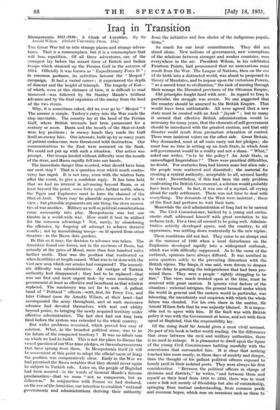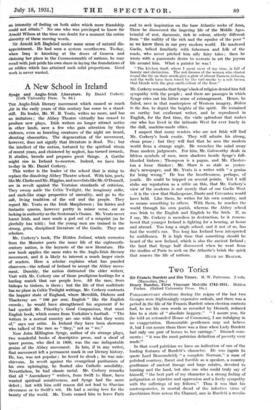Iraq in Transition
THE Great War led us into strange places and strange adven- tures. That is a commonplace, but it is a commonplace that will beak repetition. Of all these adventures, one of the strangest lay before the mixed force of British and Indian troops which steamed up the Persian Gulf in the autumn of 1914. Officially it was known as " Expeditionary Force D " ; in common parlance, its activities became the " Mespot campaign. It had a varied career ; it experienced the depth of disaster and the height of triumph. The tragedy of Kut-- . of which, even at this distance of time, it is difficult to read unmoved—was followed by Sir Stanley Maude's brilliant advance and by the final expulsion of the enemy from the land of the two rivers.
Why, it is sometimes asked, did we ever go to " Mespot " The answer is simple. Turkey's entry into the War made the step inevitable. The country lay at the head of the Persian Gulf, where British interests had been paramount for a century or more. Basra and the mouth of the Shat-el-Arab were key positions ; in enemy hands they made the Gulf itself an enemy lake. Our interests, built up by so many years of patient endeavour, were threatened with destruction. Our communications to the East were menaced on the flank. We could not put up with such a situation. Our action was prompt. Our troops landed without difficulty near the mouth of the river, and Basra rapidly fell into our hands.
The immediate danger thus averted, what should have been our next step ? That is a question over which much contro- versy has raged. It is not easy, even with the wisdom born after the event, to give a confident reply. It has been held that we had no interest in advancing beyond Basra, or at least beyond the point, some forty miles further north, where the Tigris and Euphrates meet to form the channel of the Shat-el-Arab. There may be plausible arguments for such a view ; but plausible arguments are one thing, the stern necessi- ties of war another. Military as well as political considerations come necessarily into play. Mesopotamia was but one theatre in a world-wide war. How could it best be utilised for the common advantage ? Not, surely, by abandoning the offensive, by forgoing all attempt to achieve decisive results ; not by immobilising troops—so ill spared from other theatres—in the Basra date gardens.
Be this as it may, the decision to advance was taken. The Armistice found our forces, not in the environs of Basra, but actually at the gates of Mosul, more than four hundred miles farther north. That was the position that confronted us when hostilities at length ceased. What was to be done with the vast new area which our armies had conquered? The immedi- ate difficulty was administrative. All vestiges of Turkish authority had disappeared ; they had to be replaced—that was our first and most urgent task—by some machinery of government at least as effective and beneficent as that which it replaced. The machinery was not far to seek. A gallant band of " Political " officers—with, first, Sir Percy Cox, and later Colonel (now Sir Arnold) Wilson, at their head—had accompanied the army throughout, and at each successive advance had devoted themselves, with zeal and ability beyond praise, to bringing the newly acquired territory under effective administration. The last shot had not long been fired before the system was extended to the whole country.
But wider problems remained, which proved less easy of solution. What, in the broadest political sense, was to be the future of the conquered territory ? It was no tabula rasa on which we had to build. This is not the place to discuss the
vexed question of our War-time pledges, or the embarrassments that have sprung from them. In Mesopotamia itself (it will be convenient at this point to adopt the official name of Iraq) the position was comparatively clear. Early in the War we had promised the Basra notables that they should never again be subject to Turkish rule. Later on, the people of Baghdad had been assured—in the words of General Maude's famous proclamation—that we come "not as conquerors, but as deliverers." In conjunction with France we had declared, on the eve of the Armistice, our intention to establish "national governments and administrations deriving their authority from the initiative and free choice of the indigenous popula. tions."
So much for our local commitments. They did not stand alone. New notions of government, new conceptions of the relations between stronger and weaker countries, were everywhere in the air. President Wilson, in his celebrated Fourteen Points, had pronounced that no annexations must result from the War. The League of Nations, then on the eve of its birth into a distracted world, was about to propound its theory of Mandates, and to impose upon the victorious Powers, " as a sacred trust to civilization," the task of nursing through their nonage the liberated provinces of the Ottoman Empire.
Old principles fought hard with new. In regard to Iraq in particular, the struggle was severe. No one suggested that the country should be annexed to the British Empire. That would have been unthinkable. All were agreed that a new state must be created with an Arab " façade " ; but to many it seemed that effective British administration would be necessary for many years, that the elements of self-government should be introduced with the greatest caution, and that only disaster could result from premature relaxation of control. There were insistent voices on the other side. Great Britain, they demanded, must at all costs carry out her pledges ; she must lose no time in setting up an Arab State, in which Arab self-government would be a reality and not a sham. " What," asked one writer, "is to be the policy? An Arab State, or camouflaged Imperialism ?" There were practical difficulties, no doubt. For centuries Iraq had known none but alien rule ; the people were scattered and disunited ; the material for creating a central authority, acceptable to all, seemed hardly to exist. Nevertheless, if this had been the only problem confronting the British Government, a solution would probably have been found. In fact, it was one of a myriad, all crying aloud for early settlement. • There was not time to deal with everything. The demands of the West were insistent ; those of the East had perforce to wait their turn.
Meanwhile the civil administration of Iraq had to be earned on. The Civil Commissioner, backed by a young and enthu- siastic staff, addressed himself with great resolution to his arduous task. For a time all seemed to be going well. Adminis- trative activity developed apace, and the country, to all appearance, was settling down contentedly to the new rdgime.
These conditions did not last. They came to an abrupt end in the summer of 1920 when a local disturbance on the Euphrates developed rapidly into a widespread outbreak, which was with difficulty suppressed. As to the cause of the outbreak, opinions have always differed. It was ascribed in
some quarters solely to the prevailing discontent with the British regime. The Iraqis, it was said, were driven to despair
by the delay in granting the independence that had been pro- mised them. They were a people " rightly struggling to be free." This view, much insisted upon at the time, must be received with great caution. It ignores vital factors of the situation : external intrigues, the general turmoil under which the world in general and the eastern world in particular, was labouring, the uncertainty and suspicion with which the whole future was clouded. For his own share in the matter, Sir Arnold Wilson feels that he was unjustly blamed. It is impos- sible not to agree with him. If the fault was with British policy it was with the Government at home, and not with their agent at Baghdad, that the responsibility lay.
Of the rising itself Sir Arnold gives a most vivid account. No part of his book is better worth reading. On the differences that arose between the civil and military authorities, there ' is no need to enlarge. It is pleasanter to dwell upon the figure of the young Civil Commissioner battling manfully with the convulsions that surrounded him. It is clear that nothing touched him more nearly, in those days of anxiety and danger, than the thought of his gallant political officers exposed to hourly peril in their isolated posts. They were always his first consideration. " Between the political officers in charge of divisions and districts," he writes, " and between them and myself as their head from 1918 to 1920, there was in most cases a link not merely of friendship but also of comradeship, springing from mutual understanding, from common perils and common hopes, which rose on occasions such as these to an intensity of feeling on both sides which mere friendship could not attain." No one who was privileged to know Sir Arnold Wilson at the time can doubt for a moment the entire sincerity of these moving words.
Sir Arnold left Baghdad under some sense of natural dis- appointment. He had seen a system overthrown. To-day, when Iraq is knocking at the doors of Geneva and claiming her place in the Commonwealth of nations, he may recall with just pride his own share in laying the foundations of an edifice which has attained such solid proportions. Good work is never wasted.



































 Previous page
Previous page